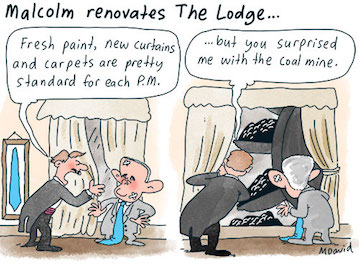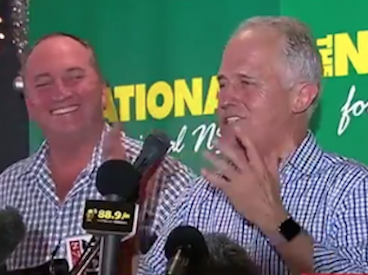"When it comes to the doctrine of separation of powers in a Westminster system, this is as serious as it gets ... These are the democratic principles at stake." ~ Ingrid Matthews
NEWS THAT THE Commonwealth Solicitor-General Justin Gleeson SC has resigned his office effective 7 November 2016 matters — and it should matter.
It is serious in law, it is serious in politics and it is serious in real life.
This is a lose-lose outcome. Nobody has won anything.
Not the "battle". Not the "war". Not the campaign, or the stoush, or the skirmish, or any of the other predictably lazy analogical language applied to the circumstances surrounding this resignation. Any wars involving Australians are in Aleppo and Mosul, a long way from the book-lined offices of the attorney-general. Any battles are one-sided affairs and consist of police persecution on the streets of Alice Springs and Darwin, and Redfern and Blacktown.
There is no war between well-remunerated white men in pinstripes with lawyerly letters after their names — and there never has been, regardless of how they came by those letters. We live in a stable constitutional monarchy.
Hold that thought. The constitution and monarchy make guest appearances in this story.
While the legacy media breathlessly borrow the language of military action, here is what Turnbull said about the resignation of his solicitor-general:
“It is always regrettable when people don't get on in the workplace.”
Regrettable. Some kind of unfortunate confluence of events, Turnbull would have us believe, rather than entirely avoidable ineptitude, coupled with utterly unforgivable immaturity.
This is the same line run by Christopher Pyne when the Coalition – whoops! – voted against itself on the floor of the House of Representatives for the first time in the history of the Australian Parliament. The Government has gone for understatement because the circumstances surrounding the Gleeson resignation is a very big deal.
As is often the case with critical incidents, what starts as a hairline fracture can split open a system and expose what lies beneath the pinstriped performances. In a kind of butterfly effect of unnecessary foot-shooting, matters which the Government would prefer not to expose to public scrutiny are now spotlighted in much brighter relief.
The most prominent matter has now been covered at length: Brandis’ 4 May direction that every request for the solicitor-general’s advice be approved by the attorney-general:
I have also issued an amendment to the Legal Services Directions 2005. The amendment will insert a new paragraph 10B and will take the form of the enclosed document.
Both the revised Guidance Note and the amended Legal Services Directions take effect immediately.
Brandis then claimed that his decision was merely the correct interpretation of the Law Officers Act, Section 12; and told Parliament he had consulted Gleeson about the change.
Former solicitor-general and chief justice of the High Court, Sir Anthony Mason QC, disagrees with Brandis’ interpretation of the statutory provision — as would just about anyone who has read it.
Gleeson said Brandis did not consult him. Shadow Attorney General Mark Dreyfus QC pointed out that either Gleeson is lying or Brandis misled Parliament. There is no reason for Gleeson to lie — if he was consulted, there would be no reason to make any kind of public pronouncement.
The ineptitude and its wash-up
Gleeson is not in the habit of publicly contradicting the Attorney-General; Brandis is, however, well in the habit of unnecessary meddling.
Brandis then told the Senate Committee on Legal and Constitutional Affairs that this all came down to the meaning of the word "consultation". It does not. Brandis brandished a dictionary but not a straightforward answer.
Turnbull went the false equivalence line favoured by conservatives everywhere:
Both the Attorney-General, the first law officer of the Crown, the solicitor-general, the second law officer, are distinguished barristers," Mr Turnbull said. "I've had the benefit of their legal advice at different times and I have confidence in each of their legal capacity and ability and we are very fortunate to have the benefit of their advice.
In fact, Justin Gleeson is a distinguished barrister and the top Commonwealth law officer, who is not also a politician. Brandis retains his position the same way every other politician does — internal factional squabbles, endlessly played out on our coin.
Meanwhile, statutory officers and public servants keep the place running. Now one of the most senior of those statutory officers has resigned.
Brandis’ meddling move was made on election-announcement eve. It could have been swamped by campaign coverage but instead everyone is talking about it. This could open up media space to meaningfully discuss the institutional arrangements of executive government in a liberal democracy.
But this space has been filled with the kind of falsities of equivalence and understatement quoted above. It is easier to report what Prime Minister Turnbull said as fact (he said it, fact checked!) than to observe the obvious implications that the Solicitor-General’s resignation is a disgrace. It is a disgrace to Brandis, to the offices of attorney-general and prime minister and to the Coalition Government.
So the fussbudget directive is a misreading of the relevant Act by the country’s highest law officer; and the Westminster convention that demands resignation of ministers who mislead Parliament has been erased from public debate.
Substantial matters of law and integrity
Political power plays and mainstream media complacency are one thing but it is the decision to misrepresent his professional advice that, in my view, go to the heart of the Solicitor-General’s decision. I do not know Gleeson, but I do know law and I also know Sydney. I will try to make the law and institutional arrangements of executive government as brief and non-boring as possible. [See more detailed post here.]
According to his answers to the Senate Legal and Constitutional Affairs Committee, Gleeson provided advice on two draft bills: one to authorise a marriage equality plebiscite and one to amend the Australian Citizenship Act 1948. This is standard practice. The Government then tabled bills on these areas of law in the House and the latter passed the Senate — it is now the Australian Citizenship (Allegiance to Australia) Act 2015).
The problem is that the bills the government tabled differed from the draft bills on which Gleeson provided his legal advice.
Brandis then told Mark Dreyfus – in writing – that the legal opinion of the Commonwealth Solicitor-General was on the version of the bill tabled in the Parliament. But the Gleeson advice was not written about some other, later, amended, different draft that he did not see. The draft the Solicitor-General read was the draft on which he wrote the legal opinion.
Bear with me.
The highest law officer, who is a politician, directly misrepresented the advice provided by the highest law officer, who is not a politician. In doing so, Brandis made what was probably solid advice (we have only Gleeson’s reputation to go on, not having seen the earlier draft that Gleeson has seen) look like very shaky advice.
The content of the advice included the legal opinion that a majority of the High Court would reject a constitutional challenge to the citizenship amendment. A Solicitor-General is highly unlikely to make a rash call on what the High Court, in its original jurisdiction, may or may not do, in the face of a constitutional challenge. The High Court can strike down a law passed by both houses of Parliament in a democracy so-called.
When it comes to the doctrine of separation of powers in a Westminster system, this is as serious as it gets. The law is the will of the people, via the sovereignty of Parliament, in a democracy, passed by properly elected representatives, and binding on all — unless it is struck down by the High Court as unconstitutional.
These are the democratic principles at stake.
It gets worse. The Bill itself authorises the Department of Immigration and Border Protection to suspend or cancel Australian citizenship. No court case. No guilty beyond reasonable doubt. No merits review. Just the legitimate authority, as bestowed by the citizenship amendment law, on executive government (the department and its minister).
Peter Dutton. Australian citizenship. Think about it.
It bears reminding that non-citizens can lawfully be – and are – imprisoned indefinitely by this country. We call it "immigration detention". The law is disgusting. It was dressed up in mendacious terror-mongering rhetoric. The Opposition stuck to its no-wedge-on-national-security nonsense. The Bill was passed by both major parties. It is an affront to decency. It is also an affront to the rule of law, to presumption of innocence, to the 500-year old writ habeas corpus, to the international law of right to a fair trial.
Would a man like Justin Gleeson SC turn his mind to such matters when writing formal legal advice in his capacity as the Commonwealth Solicitor-General? Would a man like Brandis misrepresent not just such a travesty of a bill but also the advice of the solicitor-general on it … to shore up political power?
Very hard to say.
All this is to not even touch on the next foot-shooting festival that is looming: a Federal Court application to release the Kerr-Queen correspondence in a case run by Anthony Whitlam QC and Tom Brennan. This is not unrelated – to use the double negative so favoured by our learned friends at law – to the current waste of our money on party political adversary: in the Parliament, in the media, in the Federal Court to which Brandis apparently wants to be appointed chief justice.
Read this opinion from Brennan and this post, to be assured that the Kerr-Queen correspondence, raised in questions to Gleeson before the Senate Committee on Legal and Constitutional Affairs, has everything to do with both Brandis-Gleeson and Turnbull-Abbott.
That would be the same Abbott who updated his register of interests to include patronage of Australians for a Constitutional Monarchy, in the same week the Federal Court action to release Kerr’s letters was reported. That would be the same week and the same Abbott who took on the former head of the Australian Republican Movement, one Malcolm Turnbull, at the NSW Liberal Party conference.
This thing has a way to run yet.
And what of political leadership?
Says our prime minister:
“It is regrettable when people don't get on in the workplace.”
Indeed. That will obviously successfully deflect from yet another flaming mess of bastardry and bullshit. What a masterful statement. Positively Turnbullesque.
Ingrid Matthews lectures in law at the University of Western Sydney. You can follow Ingrid on Twitter @iMusing.
Turnbull attributes Gleeson's resignation to a "regrettable" workplace pesonality clash.

This work is licensed under a Creative Commons Attribution-NonCommercial-NoDerivs 3.0 Australia License

This work is licensed under a Creative Commons Attribution-NonCommercial-NoDerivs 3.0 Australia License
Monthly Donation
Single Donation
Get the facts. Subscribe to IA for just $5.









